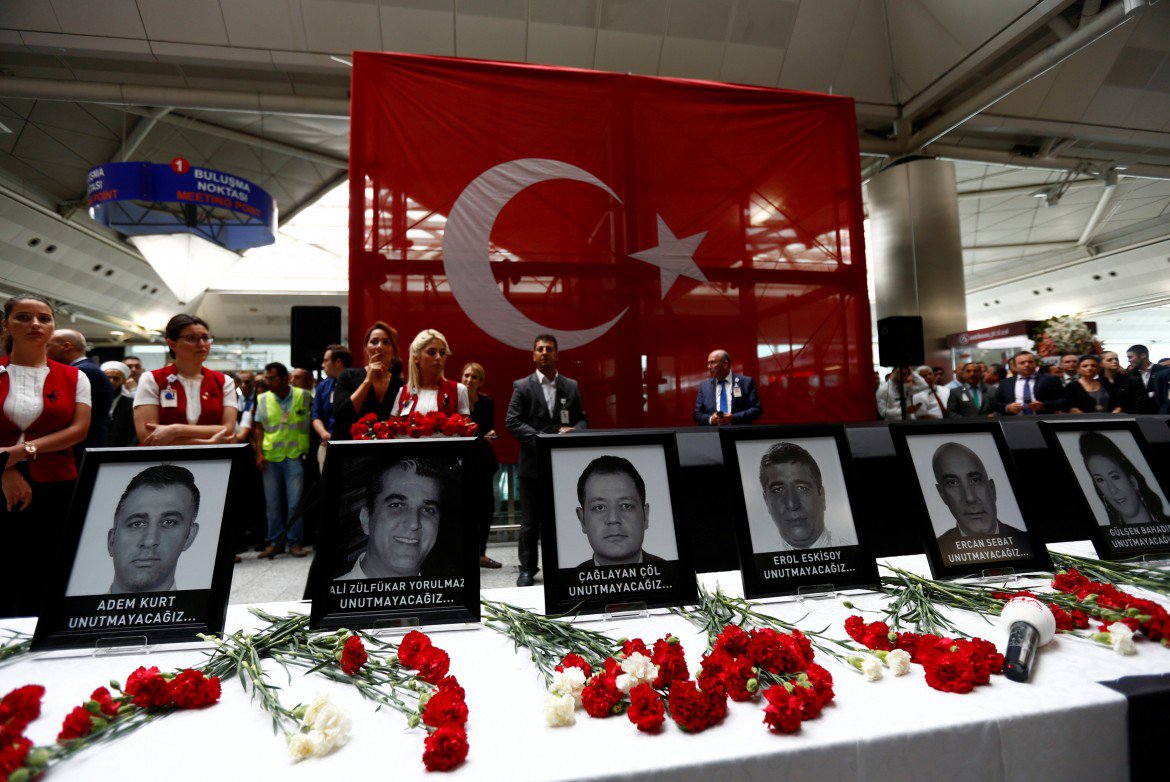Turkey
After Istanbul attack, Erdogan is in crisis
The population is growing increasingly distrustful of its government as opposition figures point to lapses in security.

The attack on the Atatürk International Airport in Istanbul caused 44 deaths, 19 of whom are non-Turkish citizens, and injured 239 people, according to the latest statements from Interior Minister Efkan Wing, numbers that don’t include the three suicide bombers.
The three attackers all arrived from Central Asia: a Russian citizen originally from Dagestan, one from Uzbekistan and another from Kyrgyzstan. The terrorists came to the airport by taxi and arrived at the control terminal wearing jackets. It being June and hot, the security agents were suspicious. Probably for this reason the first shots were fired at the entrance to the arrivals hall.
Investigators are working on the assumption this was an Islamic State attack. Turkish police Thursday morning conducted a vast anti-terrorist operation in Istanbul in the Aegean seaside city of Izmir and in the southeast of the country on the border with Syria. Twenty-two people were detained and suspected of communicating with the self-styled Islamic State. The operation in Istanbul has affected 16 districts, including those of Pendik, Basaksehir and Sultanbeyli, and 13 people were arrested there, including four foreigners. In Izmir, police simultaneously raided buildings in the central districts of the Konak, Buca and Bornova Karabağlar, arresting nine people suspected of belonging ISIS.
Police seized documents and weapons. The three bombers had stayed in an apartment in the Fatih area of Istanbul. They had rented the house three months before the attack and paid cash.
Investigators have also discovered some details of the terrorist operation. The three bombers with their explosive belts and their Kalashnikovs, three backpacks and other luggage, had taken a taxi in Fatih district and were directed to the international arrivals terminal of the airport. After getting out of the taxi they separated. One of them went directly to the parking area, another remained in the international arrivals hall and the third went to the international departure terminal.
Their plan called for the capture of dozens of hostages inside the terminal before blowing themselves up. Fortunately the plan was foiled by the intervention of a policeman at the entrance of the terminal who was suspicious and opened fire. Many other aspects of the attack have yet to be clarified.
Anger is widespread among the Turkish public, and the government opposition believe there were holes in the security apparatus. On Thursday there was a protest in Istanbul demanding transparency and a full accounting of the incident.
Surveillance cameras show that the bombers cased the arrivals hall the morning of the attack, and a well-known journalist for Dogan TV, Hande Fırat, gave a broadcast three weeks ago stating that Turkish intelligence had warned the government about the risk of an ISIS attack in Istanbul.
A few days before the attack, six members of ISIS were stopped on the highway near Tartus. They were heading for Istanbul and had with them their explosive vests.
On Thursday, a day of national mourning, the population was still incredulous, wondering how it was possible that the state security forces had not been able to protect the population from the consequences of the terror spreading for years from Syria and the rest the Middle East, infiltrating now even into Turkey’s borders.
In the last five years in Turkey, 654 people died in Islamist terror attacks. A sense of dwindling confidence in President Erdogan and his party seems to be spreading among the Turkish population, particularly because of errors in the last three years, namely mistakes related to the Syrian War and for allowing thousands of jihadists to transit through Turkish territory.
For too long Ankara has been ambiguous in its fight against the Islamic State. In the first phase of the conflict, it supported ISIS indirectly as a way to antagonize Assad, allowing the formation of various jihadist cells in its own territory. But after granting NATO its air base, ISIS began attacks not only in southeastern Anatolia, but especially in Turkey’s major cities.
Originally published at http://ilmanifesto.info/erdogan-in-crisi-dopo-lattentato/ on 2016-07-01
